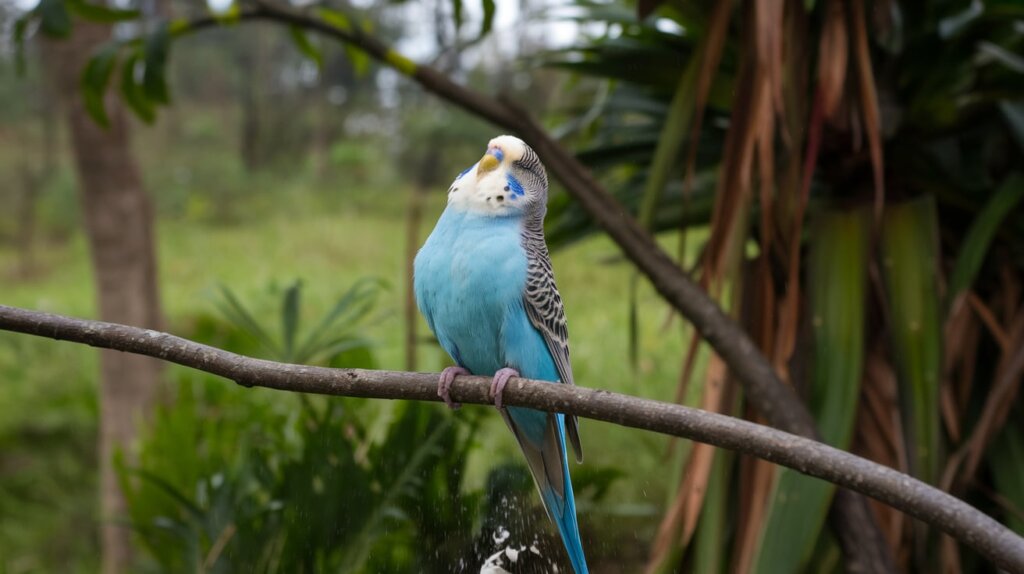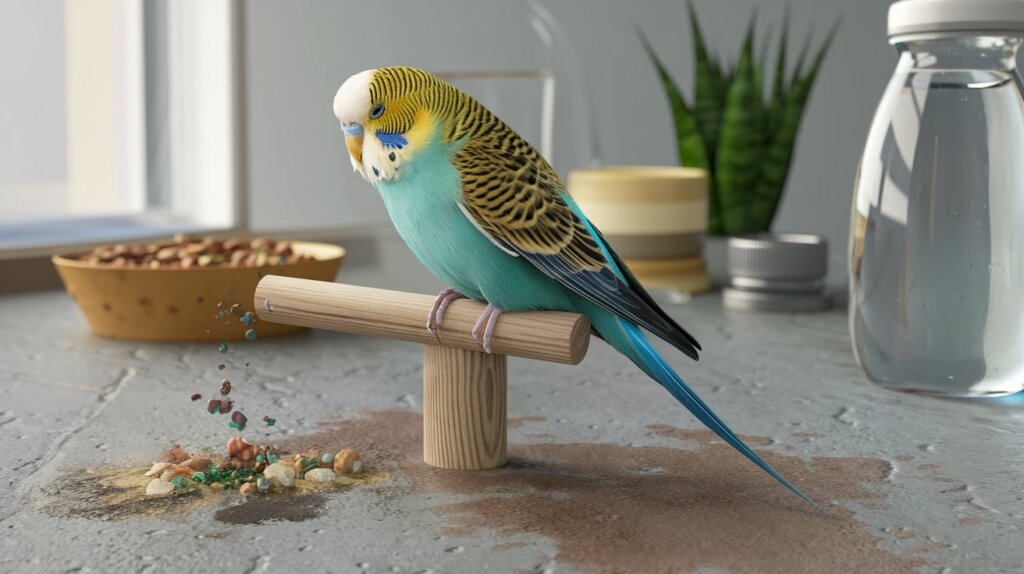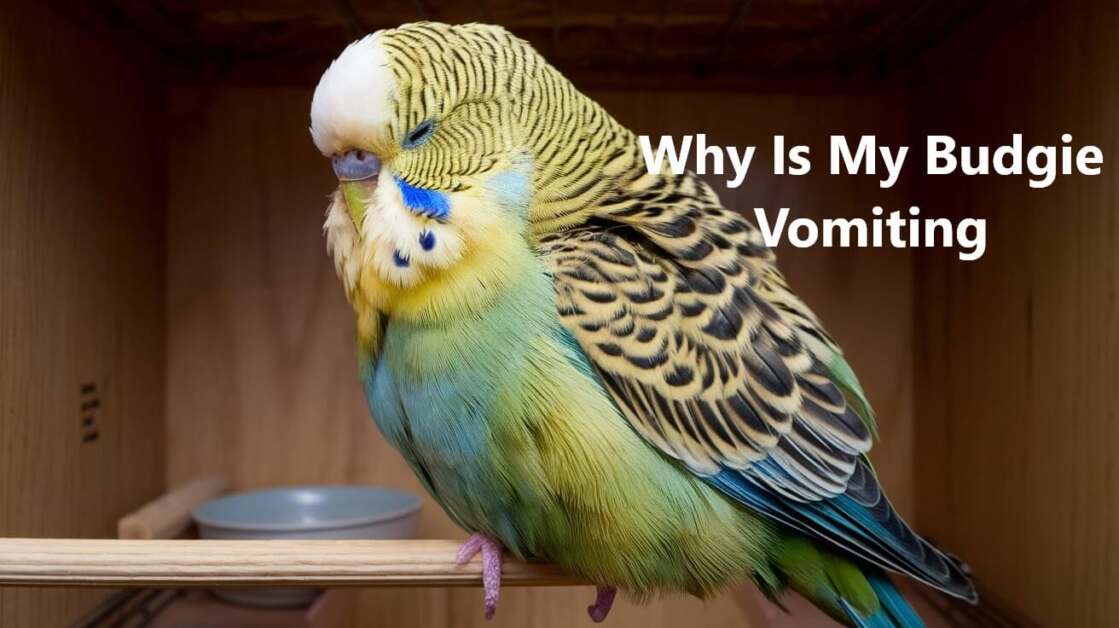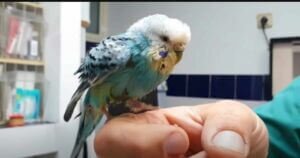Why Is My Budgie Vomiting?
Why is my budgie vomiting? Dietary issues, stress, infections, or toxins exposure can cause budgies vomiting. It’s crucial to remove harmful foods, clean their environment, and consult a vet if symptoms persist.
As a bird pet owner and wildlife enthusiast, I’ve learned much about budgies and their health. Over the 12 years, I’ve encountered many situations where budgies start vomiting, and I’ve seen how confusing and concerning it can be for pet owners. If your budgie is vomiting, you probably ask yourself, “What could be the reason?” and “Is my bird okay?”
In this article, I’ll explain what vomiting in budgies means, the causes behind it, and what you can do to help. Understanding this issue is critical because it directly impacts the health and safety of your feathered friend.
So, let’s break it down.
Why Is My Budgie Vomiting?

If your budgie is vomiting, it’s essential to address it immediately. Vomiting in birds isn’t something to ignore, as it could indicate an underlying health issue.
Vomiting differs from regurgitation, which is a normal behaviour for budgies when feeding their mate or young. Vomiting, on the other hand, often indicates stress, infection, or dietary issues.
Here’s why it happens: 5 Common Causes of Vomiting in Budgies
1. Dietary Problems
Budgies are sensitive to their diet. Eating spoiled food or a sudden change in diet can cause vomiting. A lack of variety or overfeeding with seeds can lead to an upset stomach.
When I started feeding my budgies, I noticed they weren’t getting enough fresh food, making them vomit occasionally. Adding more fruits, veggies, and pellets to their diet made a huge difference.
2. Toxicity
Budgies can get sick from eating toxic plants or consuming substances that aren’t safe for them. Avocado, chocolate, and caffeine are just a few examples of things that can make birds vomit. Always make sure any plants in the area are bird-safe.
3. Infections and Diseases
Bacterial infections, viral infections, and parasites can cause vomiting. If your budgie has other symptoms like lethargy, diarrhoea, or changes in droppings, it’s crucial to see a vet.
I’ve had one of my budgies diagnosed with a respiratory infection that caused vomiting, and getting treatment from an avian vet helped her recover quickly.
4. Stress or Anxiety
Budgies are sensitive creatures, and any environmental changes can cause them to become stressed.
Moving to a new home, introducing new pets, or even loud noises can trigger vomiting. When I moved my budgie’s cage to a new part of the house, I noticed her vomit due to the stress of the new environment.
5. Overbreeding or Hormonal Issues
Female budgies frequently breeding or in breeding conditions may experience hormonal imbalances, leading to vomiting. This happened to one of my budgies, and after consulting a vet, I learned that reducing breeding conditions helped her recover.
Signs to Watch For Vomiting Budgies

If you notice your budgie vomiting, here are some additional symptoms to watch for:
- Lethargy or lack of energy
- Loss of appetite or changes in eating habits
- Changes in droppings (e.g., more watery, discolored)
- Fluffed feathers and difficulty moving around
These are all signs that something is wrong and your bird needs immediate attention.
What Can You Do If Your Budgie Is Vomiting?
The first step in helping your vomiting budgie is identifying the cause. If you’re unsure, it’s always best to consult a vet specialising in birds.
Here are some things you can do at home to help:
1. Remove Toxic Substances
Ensure your budgie has access to safe foods. Remove any plants, food, or items that could be harmful. Offer a balanced diet with a mix of seeds, fruits, vegetables, and pellets. Keep everything clean and free from bacteria by washing their food dishes daily.
2. Manage Stress
If stress is the issue, try to provide your budgie with a quiet, calm environment. Minimize loud noises and sudden changes in their environment, and keep them away from other pets if necessary. Try giving your budgie some time alone in a quiet space to recover from stress.
3. Monitor Health and Behavior
Watch your budgie closely for any changes in behaviour or other symptoms. Are they acting unusually lethargic? Have they stopped eating? Changes in droppings are often a good sign that something is wrong and should be monitored.
4. Seek Professional Help
If the vomiting continues, and your bird shows other concerning signs (like weakness or difficulty breathing), take your budgie to an avian vet immediately. Early treatment is key to preventing serious health issues.
How Can I Prevent My Budgie from Vomiting?

Preventing vomiting is all about creating a healthy environment for your budgie. Here are a few tips that can help keep your bird safe:
1. Provide a Balanced Diet
Ensure your budgie’s diet includes fresh fruits, vegetables, and high-quality pellets. Avoid overfeeding seeds, as they can lead to obesity and poor health. I found that by incorporating fresh foods, like spinach, carrots, and apple slices, my budgies stayed healthier and vomit-free.
2. Clean Their Cage Regularly
A clean environment is essential. Remove old food, feathers, and waste daily. Regular cleaning prevents bacterial build-up that could lead to infections.
3. Limit Stressful Situations
Try to keep your budgie’s environment consistent. If you plan to make changes to their cage or home, do so gradually. If you notice your bird becoming stressed, try calming techniques, such as covering the cage at night for rest or playing soothing music.
4. Keep Toxic Plants Away
Make sure any plants in your home are safe for birds. Some common plants like azalea, cherry trees, and daffodils harm budgies. I recommend double-checking any new plants before bringing them into your home.
5. Schedule Regular Vet Checkups
Just like humans, budgies need regular health check-ups. Yearly vet visits can help detect any potential health problems before they become serious.
FAQs On Why is My Budgie Vomiting?:
1. What are the signs that my budgie is feeling unwell?
Signs that your budgie may be unwell include lethargy, puffed-up feathers, changes in droppings, and lack of appetite. If your budgie displays these symptoms, it’s essential to monitor closely.
3. Can a budgie get sick from eating too much fruit?
Yes, while fruit is healthy in moderation, overfeeding your budgie can lead to digestive issues. Too much sugar or moisture can upset their stomach, causing vomiting or diarrhea.
4. How do I calm a stressed budgie?
To calm a stressed budgie, provide a quiet, familiar environment. Reduce loud noises, avoid sudden movements, and let your bird settle into its space gradually.
5. What is the best way to clean a budgie’s cage without causing stress?
To clean a budgie’s cage without causing stress, move your bird to a quiet, safe space while cleaning. Use bird-safe cleaning products and ensure all cage accessories are dry before returning them.
2. How can I tell if my budgie has a respiratory infection?
Respiratory infections in budgies may cause wheezing, sneezing, nasal discharge, and laboured breathing. A vet visit is recommended for proper treatment if these symptoms are present.
Sum Up
If your budgie is vomiting, it’s essential to act quickly. Remember that vomiting in budgies could be a sign of dietary issues, infections, or stress, and finding the cause will help you take appropriate action.
Be vigilant about your bird’s health, and don’t hesitate to consult with a vet if you’re unsure. Following these simple tips and maintaining a clean, safe, and calm environment can help ensure that your budgie stays happy and healthy.
If you found this article helpful, please share it with other bird owners. Together, we can create safe homes for our feathered friends!
Read More
- Why Do Budgies Fall Off Their Perch?
- Budgie Dying of Old Age
- Why Does My Budgie Have A Crusty Cere?
- Why Budgie Died With Eyes Open?
- How Do Budgies Get Calcium?
- Why Do Budgies Puff Up?
Hello Dear, I'm Poli Kolymnia, owner of many birds (including budgies).
With a deep passion for these feathered companions, I'm here to share my expertise and extensive knowledge on birds care.
My articles cover essential topics like diet, housing, care, and health, providing practical tips to help you create a happy and thriving environment for your birds.







